Discover What Matters Now
What Matters Now

345 Episodes
Reverse
Welcome to What Matters Now, a weekly podcast exploring key issues currently shaping Israel and the Jewish World, with host deputy editor Amanda Borschel-Dan speaking with stand-up comedian Liz Glazer, who is coming soon to Israel as part of the annual Comedy for Koby tour. On stage and off, the former law prof -- a graduate of New York's stalwart Modern Orthodox Ramaz high school -- is loudly and proudly out about her life as the spouse of a female rabbi. Perhaps more unusually, since the October 7, 2023, Hamas onslaught on Israel, she's also made no secret of her support for the Jewish state In our conversation, we hear which of Glazer's identities -- lesbian or Jew -- is trickier for her to navigate on stage. We learn how being the granddaughter of Holocaust survivors has shaped her personality -- and career choice. And finally, we hear how becoming a mother two years ago has shifted Glazer's comedic sensibilities. Comedy for Koby is a fundraiser for the Koby Mandell Foundation, which was founded by Seth and Sherri Mandell, whose son Koby and his friend Yosef Ishran were murdered in a terrorist attack in 2001. Jumping off from the foundation's motto, "From tragedy to community," the comedy tours have brought 88 comedians to Israel since comedian Avi Liberman began hosting and organizing them in 2008. From January 5-12, Glazer will be joined by Andy Pitz and Rich Shnyder throughout Israel. And so this week, we ask Liz Glazer what matters now. What Matters Now podcasts are available for download on Apple Podcasts, Spotify, YouTube or wherever you get your podcasts. This episode was produced by the Pod-Waves.See omnystudio.com/listener for privacy information.
Welcome to What Matters Now, a weekly podcast exploring key issues currently shaping Israel and the Jewish World, with host deputy editor Amanda Borschel-Dan speaking with Ahmed Fouad Alkhatib, the head of Realign For Palestine, an Atlantic Council project that challenges entrenched narratives in the Israel and Palestine discourse. This week, we dive into the five likely scenarios that could play out in Gaza during 2026, which Alkhatib recently proposed on his social media channels. According to Alkhatib, the five proposals all "undermine Hamas severely and massively change the calculus and geostrategic landscape following the Trump-sponsored ceasefire in October, which has temporarily halted the war." The five proposals include: A mutiny from Hamas’s ranks within Gaza due to economic and cost-of-living pressures; a significant rise and empowerment of anti-Hamas militias in different areas of the Gaza Strip; mass protests and large-scale uprisings against Hamas throughout the Gaza Strip by civilians; a mass exodus of civilians, from the Red Zone controlled by Hamas behind the "yellow line" into the Israeli-controlled Green Zone; and a successful international stabilization force (ISF) deployment with the mandate of battling and demilitarizing Hamas. We go through each scenario point-by-point throughout the conversation, leaving time for a reader's question or two. And so this week, we ask Ahmed Fouad Alkhatib, what matters now. What Matters Now podcasts are available for download on Apple Podcasts, Spotify, YouTube or wherever you get your podcasts. This episode was produced by the Pod-Waves. IMAGE: Palestinians walk along a street past a tent camp in Gaza City, December 17, 2025. (AP Photo/Jehad Alshrafi)See omnystudio.com/listener for privacy information.
Welcome to What Matters Now, a weekly podcast exploring key issues currently shaping Israel and the Jewish World, with host Jessica Steinberg speaking with cookbook author Adeena Sussman. In this conversation with the bestselling author of "Sababa" and "Shabbat," Sussman discusses the intersection of cooking, culture, and personal experiences as she continues melding her American Jewish background with her current Israeli life in her recipes. She reviews aspects of her latest cookbook, "Zariz," which emphasizes quick, easy recipes with shorter lists of ingredients, and how working on it during the war offered a therapeutic outlet during troubling times. Sussman talks about her various Hanukkah recipes, tips for frying potato pancakes and sufganiyot, and how to streamline the latke-making and doughnut frying processes, if one decides to make their own. Adeena Sussman's Sheet Pan Latke BoardFor the latkes: 1½ - 1¾ lbs skin-on Russet potatoes, scrubbed (depending on your sheet pan size)1 med-large onion, peeled2 eggs2 tsps kosher salt, plus more to taste½ tsp freshly cracked black pepper3-4 tablespoons potato starch, cornstarch or flour¼ - ⅓ cup olive oil Toppings ideas: Gravlax, sour cream, dill, lemon zest, capersSour cream + fish eggs + green onionAvocado + chili crispHorseradish sour cream + quail eggPear GorgonzolaPomme persimmonLabaneh + jamApple butter InstructionsArrange a rack in the center of the oven. Preheat to 450°F. Grate the potatoes and onions on the large holes of a box grater into a large bowl. Using both hands, squeeze out and discard as much of the liquid from the potatoes as possible; transfer them to a second bowl. Add the oil to a quarter-sheet pan (or 9 x 13 inch glass metal baking dish); place in the oven and heat until the oil is very hot but not smoking, 7 to 8 minutes. During the last two minutes of the oil heating, stir the eggs, salt, pepper, and potato starch into the potato-onion mixture. Carefully remove the sheet pan from the oven. Quickly pour and spread the latke batter across the pan; tip and spoon any excess oil over the top. Bake until deep golden brown and crisp, 23 to 25 minutes (or longer as needed). Cut into squares and top with the toppings of your choice. What Matters Now podcasts are available for download on Apple Podcasts, Spotify, YouTube or wherever you get your podcasts. This episode was produced by the Pod-Waves. IMAGE: Cookbook author Adeena Sussman with her latest, 'Zariz,' in December 2025. (Courtesy)See omnystudio.com/listener for privacy information.
Welcome to What Matters Now, a weekly podcast exploring key issues currently shaping Israel and the Jewish World, with host Amanda Borschel-Dan speaking with James Pasch, the Anti-Defamation League's vice president of litigation. Pasch, is currently in Israel to meet with the plaintiffs in a massive lawsuit the ADL initiated against Iran, North Korea, Syria and Hamas, for their part in the October 7 massacre. In a new strategy, the legacy Jewish organization's work in fighting antisemitism is moving to encompass lawfare and since the Hamas onslaught on southern Israel on October 7, 2023, the ADL has filed more lawsuits than in all the years of the existence of the organization. In this podcast, we discuss how the ADL and other legal organizations are being creative in repurposing laws and redefining terms. We also hear about the struggle to remain firmly inside the Constitution and Bill of Rights when taking on the campus protests that test the boundaries of Freedom of Speech. And we learn how the ADL is preparing for the next big wave of campus hate. And so this week, we ask James Pasch, what matters now. What Matters Now podcasts are available for download on Apple Podcasts, Spotify, YouTube or wherever you get your podcasts. This episode was produced by the Pod-Waves. IMAGE: James Pasch (courtesy)/ People hold US and Israeli flags as they gather before the release of Israeli hostages held in Gaza, outside a military base near Re'im, southern Israel, October 13, 2025. (AP Photo/Leo Correa)See omnystudio.com/listener for privacy information.
Welcome to What Matters Now, a weekly podcast exploring key issues currently shaping Israel and the Jewish World, with host Amanda Borschel-Dan speaking with Dr. Gilad Malach, a research fellow at the Israel Democracy Institute. Malach's research focuses on public policy related to Israel's ultra-Orthodox community, including issues critical to its integration into Israel's economy and society. This week, the Knesset Foreign Affairs and Defense Committee is debating a new bill aimed at regulating Haredi draft exemptions. Starting with the foundation of the state in 1948, Malach takes us through the evolution of the ultra-Orthodox community's refusal to serve in the IDF. We hear of previous efforts to entice the population to join the army and how badly they failed. Malach takes us through the unique make-up of the ultra-Orthodox household, in which women generally are more educated and go out to work, while men form a "community of learners." As this new legislation is being debated, we learn what is at stake for the community, as well as the frustrations from the majority of Israelis who are shouldering the national burden. And so this week, we ask Dr. Gilad Malach, what matters now. What Matters Now podcasts are available for download on Apple Podcasts, Spotify, YouTube or wherever you get your podcasts. This episode was produced by the Pod-Waves. IMAGE: Ultra-Orthodox Jews from the two rival factions of the Ponevezh Yeshiva stand outside the yeshiva following a mediation session held at the place, in Bnei Brak, November 19, 2025. (Erik Marmor/Flash90)See omnystudio.com/listener for privacy information.
Welcome to What Matters Now, a weekly podcast exploring key issues currently shaping Israel and the Jewish World, with host Amanda Borschel-Dan speaking with Ahmed Fouad Alkhatib, the head of Realign For Palestine, an Atlantic Council project that challenges entrenched narratives in the Israel and Palestine discourse. This summer, Alkhatib flew over Gaza as part of the last days of the United Arab Emirates's aid drop missions. It was the first time since he had seen his former home since leaving the enclave in 2005 for what was meant to have been a high school year abroad. To begin the program, Alkhatib relates how he felt viewing the swaths of destruction two years of war had left in its wake. An outspoken anti-Hamas voice, Alkhatib promotes what he calls “radical pragmatism” through his work with the Atlantic Council and his speaking engagements around the world. No short on considered criticism for Israel's prosecution of the war sparked by Hamas's murderous onslaught on southern Israel on October 7, 2023, we learn of concrete steps that could be taken to drive out the terrorist organization. We hear how Hamas is re-rooting itself into all aspects of the Strip's governance. Now that the terror regime has been reestablished, so has law and order, says Alkhatib, leaving Gazans stuck in a "safe-ish," but abusive relationship. And so this week, we ask Ahmed Fouad Alkhatib, what matters now. What Matters Now podcasts are available for download on Apple Podcasts, Spotify, YouTube or wherever you get your podcasts. This episode was produced by the Pod-Waves. IMAGE: A tent camp for displaced Palestinians stand amid the destruction left by Israeli strikes north of Gaza City, November 25, 2025. (AP Photo/Jehad Alshrafi)See omnystudio.com/listener for privacy information.
Welcome to What Matters Now, a weekly podcast exploring key issues currently shaping Israel and the Jewish World, with host Amanda Borschel-Dan speaking with the past president of The Hebrew University, Prof. Asher Cohen. During the eight years Cohen served as university president, Israel encountered numerous challenges, including the coronavirus epidemic from February 2020, the uproar over the Judicial overhaul and, most seriously, of course, the October 7, 2023, Hamas onslaught on southern Israel that left 1,200 murdered and 250 taken hostage to the Gaza Strip. It also meant a major call-up of reserves, which greatly impacted the pool of students over the past two years. Even more threatening to Israel's future, argues Cohen, is that following the beginning of the war, Israeli academics began facing boycotts and funding drops. Without collaborations with institutions abroad, the Ivory Tower will quickly crumble, we hear. But we’re also going to look to the future, because Cohen is spearheading a national AI infrastructure initiative which the government has approved, to the tune of $500 million. And so this week, we ask Prof. Asher Cohen, what matters now. What Matters Now podcasts are available for download on Apple Podcasts, Spotify, YouTube or wherever you get your podcasts. This episode was produced by the Pod-Waves. IMAGE: Prof. Asher Cohen (Igor Farberov)/ The Albert Einstein privet library, Hebrew University in Jerusalem, March 19, 2012. (MENAHEM KAHANA / AFP)See omnystudio.com/listener for privacy information.
Welcome to What Matters Now, a weekly podcast exploring key issues currently shaping Israel and the Jewish World, with host Amanda Borschel-Dan speaking with The Times of Israel's senior analyst Haviv Rettig Gur. BBC director-general Tim Davie and Deborah Turness, the chief executive of BBC News, stepped down this week after being in the firing line for months over allegations of bias — including the national broadcaster’s coverage of antisemitism, the war in Gaza, and Israel more generally. Rettig Gur is just back from London and we hear his disheartening impressions of how that corner of the Jewish Diaspora is faring. US President Donald Trump sent a letter to President Isaac Herzog on Wednesday formally asking Israel’s head of state to pardon Prime Minister Benjamin Netanyahu, who is on trial for corruption. Herzog's office issued a statement that a pardon request must go through the proper channels. We first ask whether a pardon is even possible, if, as Opposition Leader Yair Lapid stated Wednesday, it would require the premier to admit he broke the law. Regardless of admissions of guilt, Rettig Gur explains why he has some hopes that Netanyahu will be pardoned. Spoiler: It's not because Rettig Gur is especially a fan of Israel's leader. And so this week, we ask Haviv Rettig Gur, what matters now. What Matters Now podcasts are available for download on Apple Podcasts, Spotify, YouTube or wherever you get your podcasts. This episode was produced by the Pod-Waves. IMAGE: President Donald Trump talks with Israel's Prime Minister Benjamin Netanyahu at the Knesset, Israel's parliament, October 13, 2025, in Jerusalem. (Saul Loeb/Pool via AP)See omnystudio.com/listener for privacy information.
Welcome to What Matters Now, a weekly podcast exploring key issues currently shaping Israel and the Jewish World, with host Amanda Borschel-Dan speaking with ToI film reviewer Jordan Hoffman. The duo beta-tests their soon-to-be-launched podcast series — so new it does not yet have a name — in which they will deliver entertainment news from a Jewish angle (aka Jangle) and review one new or noteworthy film. This week, in episode zero, the pair first discusses the growing boycott of Israeli filmmakers at international festivals. Hoffman weighs in on how this is misfiring when it comes to some of the more prominent -- and very left-wing -- Israeli artists. Next, we hear about "Nuremberg," the Hollywood treatment of the Nuremberg Trials, which began in November 1945, launching the field of international law. In the film, psychiatrist Douglas Kelley (Rami Malek) is ordered to evaluate whether Hermann Göring (Russell Crowe) is fit to stand trial. As the highest-ranking surviving Nazi military commander, to the Allied lawyers, Göring is the "big fish" that must be landed. Borschel-Dan and Hoffman give their differing opinions of the movie and agree to disagree. And so this week, we ask Jordan Hoffman, what matters now. What Matters Now podcasts are available for download on Apple Podcasts, Spotify, YouTube or wherever you get your podcasts. This episode was produced by the Pod-Waves. IMAGE: Jordan Hoffman (courtesy) / Rami Malek and Russell Crowe attend the 'Nuremberg' AFI Fest red carpet premiere screening at TCL Chinese Theatre on October 24, 2025, in Hollywood, California. (Vivien Killilea/Getty Images for Sony Pictures Classics/AFP)See omnystudio.com/listener for privacy information.
Welcome to What Matters Now, a weekly podcast exploring key issues currently shaping Israel and the Jewish World, with host Jessica Steinberg speaking with former hostage Eli Sharabi. Sharabi, whose bestselling book, "Hostage," was recently translated into English, spoke to What Matters Now a few days before burying his brother, Yossi Sharabi, whose body was recently released home to Israel after he was taken hostage on October 7 from Kibbutz Bee'eri, the community where both brothers lived with their families. Sharabi speaks about reuniting with recently released hostage Alon Ohel, his fellow captive from months in a Gaza tunnel, and the joy of realizing that reunion. He talks about how work, the book, and public speaking have been therapeutic acts for him, after his wife and daughters were killed on October 7. Sharabi speaks about Kibbutz Be’eri, where he lived for 35 years, his chosen community that can no longer be a home for him, but that he hopes will be rehabilitated and rebuilt. And so this week, we ask Eli Sharabi, what matters now. What Matters Now podcasts are available for download on Apple Podcasts, Spotify, YouTube or wherever you get your podcasts. This episode was produced by the Pod-Waves. IMAGE: At the October 27, 2025 Kibbutz Be'eri burial for Yossi Sharabi, whose body was brought back from Gaza captivity, with his brother, former hostage Eli Sharabi, center, eulogizing him (Paulina Patimer/Hostages Forum)See omnystudio.com/listener for privacy information.
Welcome to What Matters Now, a weekly podcast exploring key issues currently shaping Israel and the Jewish World, with host Jessica Steinberg speaking with Orna and Ronen Neutra, parents of Omer Neutra, a tank platoon commander who was killed on October 7, 2023, his body taken hostage by Hamas terrorists. The Neutras, Israeli-born Americans who have been living in the US for the last 20 years, talk about the last days since the start of the ceasefire, the joyous return home of 20 living hostages, as the bodies of 13 hostages are still held in Gaza. Orna Neutra discusses how they knew they would never hug their son again, but how difficult it is to reconcile his death until they can bury his body. Ronen Neutra offers more details about October 7, 2023, his son's heroic final moments as a commander on the so-called White House IDF post near the Gaza border. The Neutras discuss their alliance with both the Biden and Trump administrations over the last two years, their more than 40 visits to Washington, DC, and how each US administration embraced the hostage families. Yet, says Orna Neutra, there is still the challenge of explaining that a deceased hostage is still a hostage, and can't remain in Gaza. Ronen Neutra talks about the gray zones of the ceasefire agreement concerning the deceased hostages, and how this war is not over until the last hostage is back. And so this week, we ask Orna and Ronen Neutra, what matters now. What Matters Now podcasts are available for download on Apple Podcasts, Spotify, YouTube or wherever you get your podcasts. This episode was produced by the Pod-Waves. IMAGE: Ronen and Orna Neutra, parents of Omer Neutra, killed on October 7, 2023, his body still held in Gaza, at the October 18, 2025 rally at Tel Aviv's Hostages Square (Tzachi Dovrat/Israeli Pro-Democracy Protest Movement)See omnystudio.com/listener for privacy information.
Welcome to What Matters Now, a weekly podcast exploring key issues currently shaping Israel and the Jewish World, with host Amanda Borschel-Dan speaking with author and public intellectual Micah Goodman. Looking to the French for historical framing, Goodman proposes that Israel is on the brink of a new epoch -- the third Israeli republic. The author of influential works such as “Catch-67” hypothesizes that Prime Minister Benjamin Netanyahu's signing on to US President Donald Trump's 20-point plan signals a tectonic shift in political alignment -- away from extremism. Today, says Goodman, as most Israelis turn their eyes to a horizon of normalization with Arab and Muslim countries, the fundamental division in Israeli politics is not between the left and the right, but rather the right and the far-right, he says. As the war winds down and grassroots activists prepare for the October 2026 elections, Goodman proposes that most Israelis are not far apart in their key values, and unity can prevail to bring to fruition a new political era. And so this week, we ask Micah Goodman, what matters now. What Matters Now podcasts are available for download on Apple Podcasts, Spotify, YouTube or wherever you get your podcasts. This episode was produced by the Pod-Waves. IMAGE: Micah Goodman (courtesy) / Israeli excavators work in the Gaza Strip as the sun sets, seen from southern Israel, October 14, 2025. (AP Photo/Leo Correa)See omnystudio.com/listener for privacy information.
Welcome to What Matters Now, a weekly podcast exploring key issues currently shaping Israel and the Jewish World, with host Amanda Borschel-Dan speaking with The Times of Israel's senior analyst Haviv Rettig Gur, marking two years since the October 7, 2023, Hamas onslaught on southern Israel. To gain a sense of the Israeli public sentiment after two years of war, Rettig Gur analyzes a new survey conducted by Agam Labs and The Hebrew University of Jerusalem, led by Nimrod Nir and Dr. Gayil Talshir. The researchers found, in surveying 2,170 Jewish Israelis and 459 Arab Israelis, that there is a drastic shift in Israelis' perceptions of their society and politicians. In one of the more dramatic findings, the report states that the initial unity found in the early months of the war has flipped to a division: from 77% in 2023 saying the war “united society” to 66% in 2025 saying it made society more divided. Pointing to Israel's strengths and human capital, Rettig Gur leaves us with an optimistic framing of the internal work that needs to be done, even as Israel has largely defeated its greatest enemies. And so this week, we ask Haviv Rettig Gur, what matters now. What Matters Now podcasts are available for download on Apple Podcasts, Spotify, YouTube or wherever you get your podcasts. This episode was produced by the Pod-Waves. IMAGE: On October 7, 2025, thousands assemble in Hostages Square, Tel Aviv, to watch the broadcast of the Bereaved Families Memorial Ceremony marking two years since the October 7, 2023, massacre. (Paulina Patimer)See omnystudio.com/listener for privacy information.
Welcome to What Matters Now, a weekly podcast exploring key issues currently shaping Israel and the Jewish World, with host Jessica Steinberg speaking with Rachel Goldberg-Polin, mother of murdered hostage Hersh Goldberg-Polin. Goldberg-Polin, who has become a well-known voice in the Jewish and Israeli world since October 7, 2023, when Hersh was taken captive by Hamas terrorists, speaks about the challenge of being active, present, and even thankful in the aftermath of Hersh's death. She speaks about the public nature of the family's mourning, as she and her husband, Jon Polin, remain active advocates for the remaining hostages, but grapple with their deep mourning in the public eye. Goldberg-Polin shares anecdotes about her life, including her extended Jerusalem community during the high holiday period, and her desperate hope to grow from the challenges she's faced during the last two years. She speaks about the need to help repair herself and the world around her and the need for some relief from the pain and suffering of this time period. And so this week, we ask Rachel Goldberg-Polin, what matters now. What Matters Now podcasts are available for download on Apple Podcasts, Spotify, YouTube or wherever you get your podcasts. This episode was produced by the Pod-Waves. IMAGE: People walk next to a mural of hostage Hersh Goldberg-Polin in central Jerusalem, August 18, 2025. (Photo by Chaim Goldberg/Flash90)See omnystudio.com/listener for privacy information.
Welcome to What Matters Now, a weekly podcast exploring key issues currently shaping Israel and the Jewish World, with host deputy editor Amanda Borschel-Dan speaking with Yossi Klein Halevi. This week, we speak with Hartman Institute senior fellow, author and thinker Yossi Klein Halevi from his Jerusalem home overlooking the back of the Mount Herzl National Military Cemetery. With that backdrop, we delve into a recently published Klein Halevi essay, "Our season of reckoning: Israel’s moral crossroads in Gaza," which he said was the hardest piece he's ever written -- and the one that has received the most response. We learn why Klein Halevi felt it important to chart this moment of ethical dimension, as it is unlike any other the IDF and the nation has faced. While Klein Halevi may not have the answers to the multitude of questions facing the world's most moral army, he believes the struggle and questioning are imperative for both Israelis and Diaspora Jews. And so this week, we ask Yossi Klein Halevi, what matters now? What Matters Now podcasts are available for download on Apple Podcasts, Spotify, YouTube or wherever you get your podcasts. This episode was produced by the Pod-Waves. IMAGE: Yossi Klein Halevi (courtesy) / People take part in a protest demanding the immediate release of all hostages held by Hamas and calling for the end of the war in the Gaza Strip, in Jerusalem, September 3, 2025. (AP Photo/Leo Correa)See omnystudio.com/listener for privacy information.
Welcome to What Matters Now, a weekly podcast exploring key issues currently shaping Israel and the Jewish World, with host deputy editor Amanda Borschel-Dan speaking with Daniel Gordis. Gordis, an author, scholar, rabbi, activist and sometime Times of Israel blogger, is the creator of the popular Substack blog and podcast, "Israel from the Inside." He recounts how he began the blog in 2021 to pull the curtain back on the Jewish state for those living abroad. In this episode, we discuss the evolution Gordis's decision to be a pro-Israel, yet critical voice in a tricky global environment of rising antisemitism and uncertainty. Wearing his rabbi hat, he speaks about how existential loneliness is a part of the experience of this season of High Holy Days and he further describes the loneliness of being Israeli at this time in history. Gordis challenges American Jews to consider that Israelis are fighting for their homeland -- both in Gaza and during the ongoing protests in the streets. And so this week, we ask Daniel Gordis, what matters now? What Matters Now podcasts are available for download on Apple Podcasts, Spotify, YouTube or wherever you get your podcasts. This episode was produced by the Pod-Waves. IMAGE: Daniel Gordis (courtesy) / A California Highway Patrol (CHP) officer detains a protestor while clearing a pro-Palestinian, anti-Israel encampment after dispersal orders were given at the University of California, Los Angeles (UCLA) campus, on May 2, 2024 in Los Angeles, California. (MARIO TAMA / GETTY IMAGES NORTH AMERICA / Getty Images via AFP)See omnystudio.com/listener for privacy information.
Welcome to What Matters Now, a weekly podcast exploring key issues currently shaping Israel and the Jewish World, with host deputy editor Amanda Borschel-Dan speaking with senior analyst Haviv Rettig Gur. There are still lots of questions and not a lot of answers after a bold Israeli airstrike targeted a meeting of Hamas’s top leaders in Qatar’s capital, Doha, on Tuesday. According to some reports, the leadership had gathered to discuss a new US-sponsored hostage-ceasefire proposal aimed at ending the war in Gaza. At publication, reports still differ as to whether the attack was successful. And just before recording on Wednesday, the IDF confirmed it had carried out strikes against the Houthis in Yemen, saying it struck military camps where operatives were gathered, the headquarters of the terror group’s propaganda division, and a fuel depot, in both Sanaa and in the al-Jawf area north of the capital. Borschel-Dan asks Rettig Gur: Is Israel acting like an unpredictable "Middle Easterner" to restore deterrence on all fronts? In a quick-take conversation, we hear why Rettig Gur doesn't put much weight into diplomatic theatrics as Israel fights its existential war against the Hamas terror group that launched the war on October 7, 2023. We ask: What does it mean to fail in a daring op? Has Israel burned all of its allies' goodwill? And so this week, we ask Haviv Rettig Gur, what matters now?What Matters Now podcasts are available for download on Apple Podcasts, Spotify, YouTube or wherever you get your podcasts. This episode was produced by the Pod-Waves. Illustrative image: The Emir of Qatar, Sheikh Tamim bin Hamad Al Thani in Astana, Kazakhstan, October 13, 2022. (Vyacheslav Prokofyev, Sputnik, Kremlin Pool Photo via AP, File)See omnystudio.com/listener for privacy information.
Welcome to What Matters Now, a weekly podcast exploring key issues currently shaping Israel and the Jewish World, with host Jessica Steinberg speaking with Australians Tamar Paluch and Deborah Conway, the editor and a contributor to "Ruptured, Jewish Women in Australia Reflect on Life Post-October 7," a book of essays. Paluch, who edited the book with Lee Kofman, discusses how the idea came from a painful place, after the events of October 7 brought a deluge of antisemitism upon Australia's Jewish community. She talks about putting together a book written and edited by women, as it was the silence of women's organizations regarding the sexual crimes committed by Hamas terrorists during the October 7 terrorist attack that prompted her and her co-editor to launch the project. Conway, one of the contributors and a well-known Australian musician and performing artist, speaks about the antisemitism and hatred she experienced in the wake of October 7, as many of her appearances and performances were canceled and sometimes interrupted by virulent pro-Palestinian protestors. Both women discuss the historical background of Australian Jewry and the sense that the dream of a Jewish paradise has ended, and how they plan on moving forward. And so this week, we ask Tamar Paluch and Deborah Conway what matters now. What Matters Now podcasts are available for download on Apple Podcasts, Spotify, YouTube or wherever you get your podcasts. This episode was produced by the Pod-Waves. IMAGE: Palestinian supporters wave flags as they march to the Sydney Opera House in Sydney, Monday, Oct. 9, 2023. Hundreds of pro-Palestinian protesters gathered at the Sydney Opera House, which was planned to be illuminated in the colors of the Israeli flag following the weekend Hamas attack on Israel, while police advised the Jewish community to stay away. (AP Photo/Rick Rycroft)See omnystudio.com/listener for privacy information.
Welcome to What Matters Now, a weekly podcast exploring key issues currently shaping Israel and the Jewish World, with host deputy editor Amanda Borschel-Dan speaking with legal expert on genocide Menachem Rosensaft. Rosensaft is an adjunct professor of law at Cornell Law School and lecturer-in-law at Columbia Law School, where he teaches the law of genocide -- since 2008 at Cornell and since 2011 at Columbia. A dedicated pro-Israel US Jewish leader, Rosensaft is the general counsel emeritus of the World Jewish Congress and has been part of the Israeli-Palestinian peace process, most notably sitting with PLO leader Yasser Arafat alongside four other American Jewish leaders in 1988, after which Arafat said he recognized the State of Israel's right to exist. Rosensaft discusses the important legal and rhetorical distinction between genocide and crimes against humanity or war crimes, feeling that the definition's precision is being diluted in popular use. We learn about the history and evolution of Raphael Lemkin's definition of genocide and the ripple effect it has caused. He emphasizes that Israel cannot be held out as the sole villain in the ongoing war, and explains how Hamas exhibits genocidal intent and ideology. However, the statements from a handful of far-right Israeli politicians is making South Africa's December 2023 legal case accusing the Jewish state of genocide much harder to win. Finally, he rails against the Israeli government's weaponization of the word "antisemitism" for all dissent against the Jewish state, but doubles down on the need for an ongoing peace process leading to a Palestinian state. And so this week, we ask genocide legal expert Menachem Rosensaft, what matters now. What Matters Now podcasts are available for download on Apple Podcasts, Spotify, YouTube or wherever you get your podcasts. This episode was produced by the Pod-Waves. IMAGE: Menachem Rosensaft (courtesy) / Palestinians stand on the edge of a crater after Israeli military strikes in a tent camp for displaced people near Al-Aqsa Hospital, in Deir al-Balah, August 21, 2025. (AP Photo/Jehad Alshrafi)See omnystudio.com/listener for privacy information.
Welcome to What Matters Now, a weekly podcast exploring key issues currently shaping Israel and the Jewish World, with host deputy editor Amanda Borschel-Dan speaking with former US negotiator, adviser and ambassador Dennis Ross. Today, Ross, an author and the counselor and William Davidson Distinguished Fellow at the Washington Institute for Near East Policy, also teaches at Georgetown University’s Center for Jewish Civilization. But for over a decade, he was the US point man on the arduous Israeli-Palestinian peace processes in both the George H.W. Bush and Bill Clinton administrations. We close the program by hearing thoughts on the current talks to end the Gaza War from a negotiator who was in the room "when it happened" -- or didn't. However, we begin the episode by asking Ross, who has decades of experience in Soviet and Middle East policy, for his analysis of this week's Alaska summit between US President Donald Trump and Russian President Vladimir Putin and the subsequent meet-up between Trump, Ukrainian President Volodymyr Zelensky and European leaders. We then spin the globe and focus on Israel and the region -- present and past, including the two milestones of the 2005 Disengagement and the 2000 Camp David Summit. And so this week, we ask Ambassador Dennis Ross, what matters now. What Matters Now podcasts are available for download on Apple Podcasts, Spotify, YouTube or wherever you get your podcasts. This episode was produced by the Pod-Waves. IMAGE: Dennis Ross (Courtesy)/ Demonstrators march during a protest demanding the immediate release of hostages held by Hamas and calling for the Israeli government to reverse its decision to take over Gaza City and other areas in the Gaza Strip, in Tel Aviv, Israel, August 17, 2025. (AP Photo/Ohad Zwigenberg)See omnystudio.com/listener for privacy information.



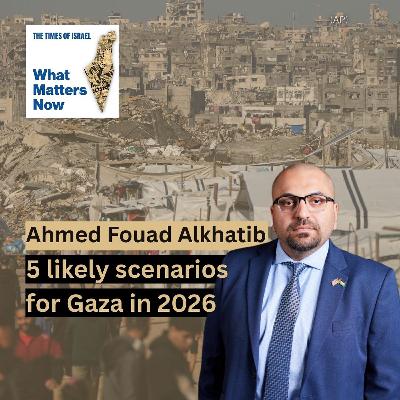
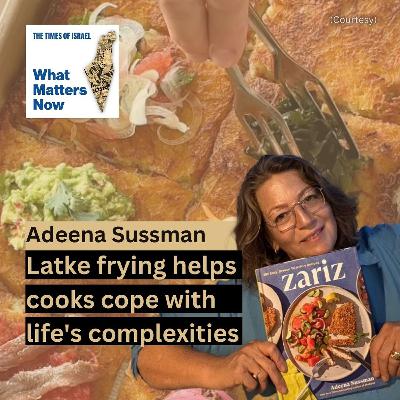
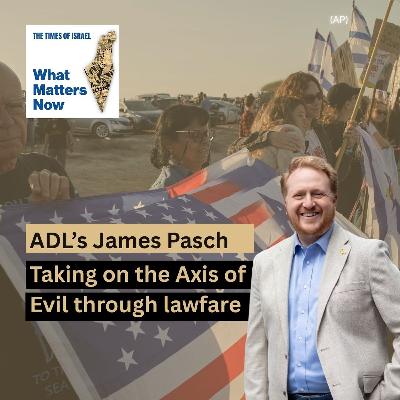
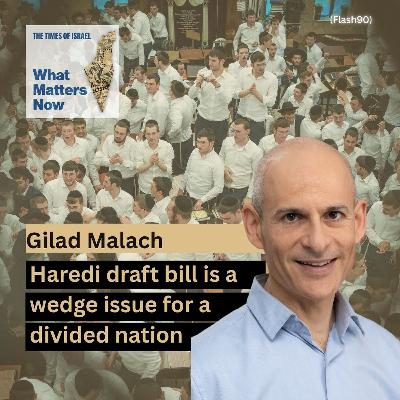
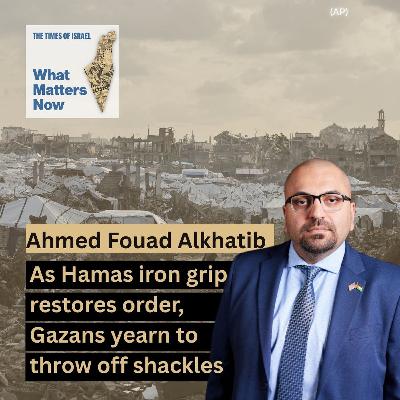
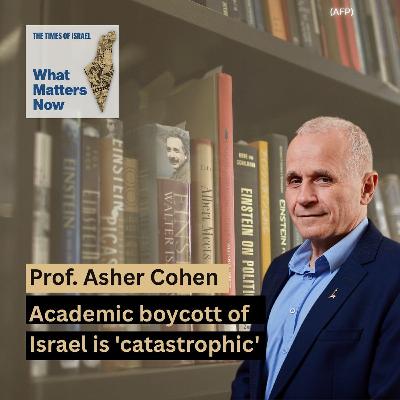
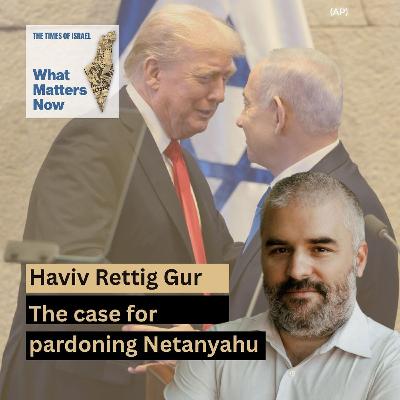
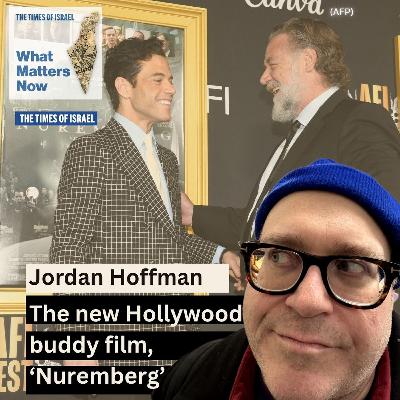
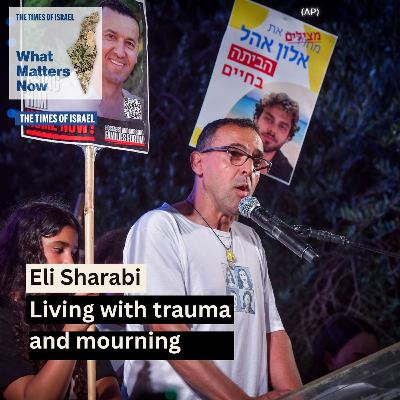
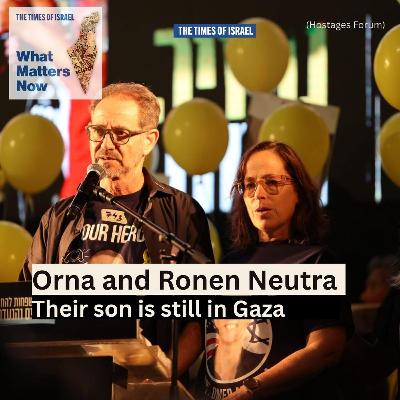

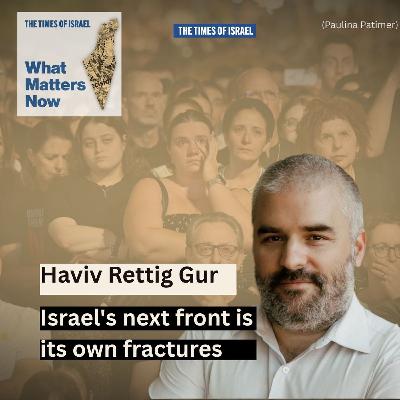
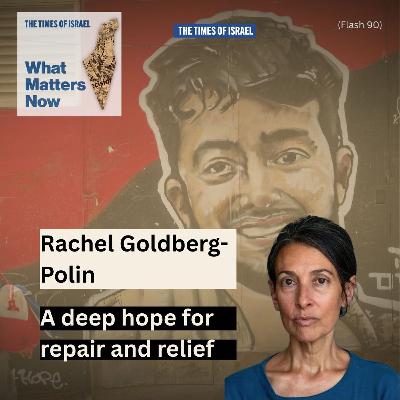
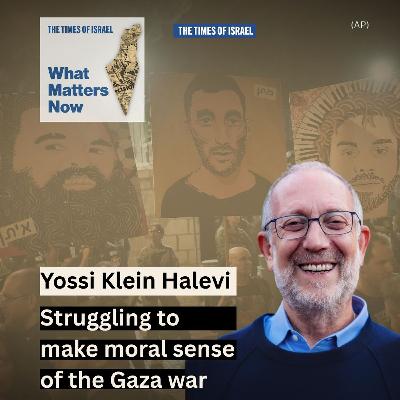
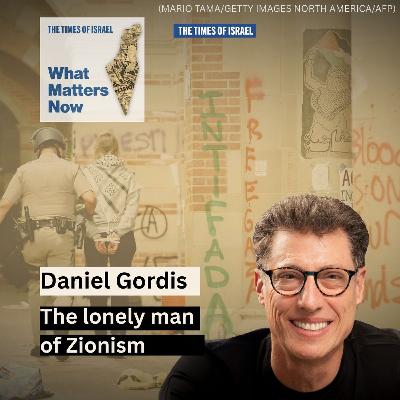
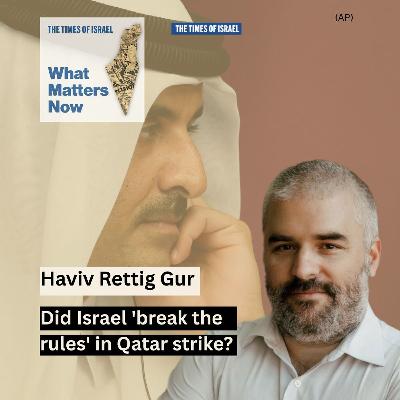
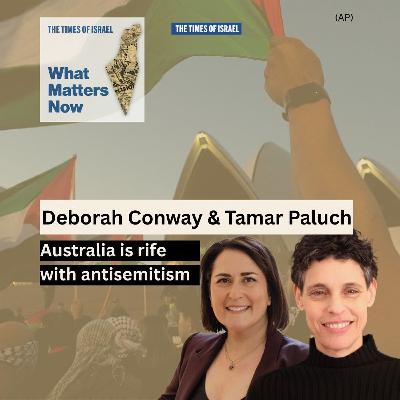
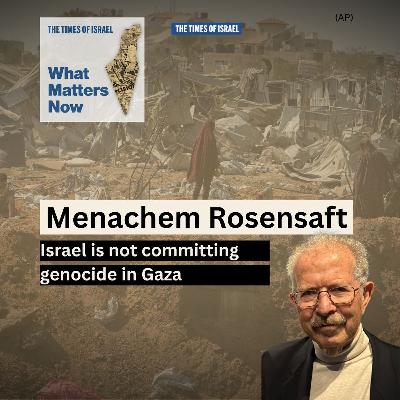
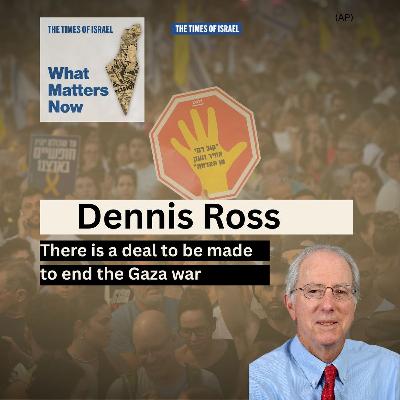



What an extraordinary conversation! Measured, informative and incredibly touching
really boring and irrelevant don't buy imports if they're too expensive
I would have loved to listen to this but unfortunately the audio for the person being interviewed was completely unintelligible.